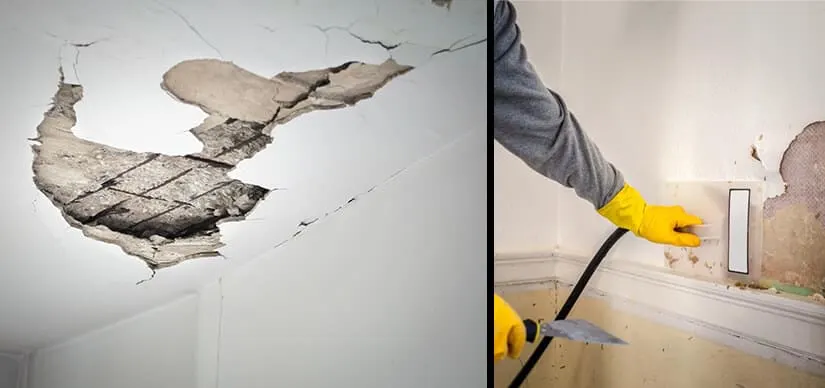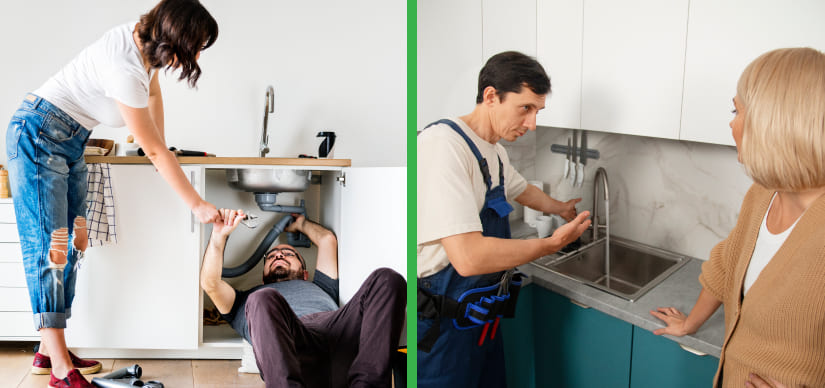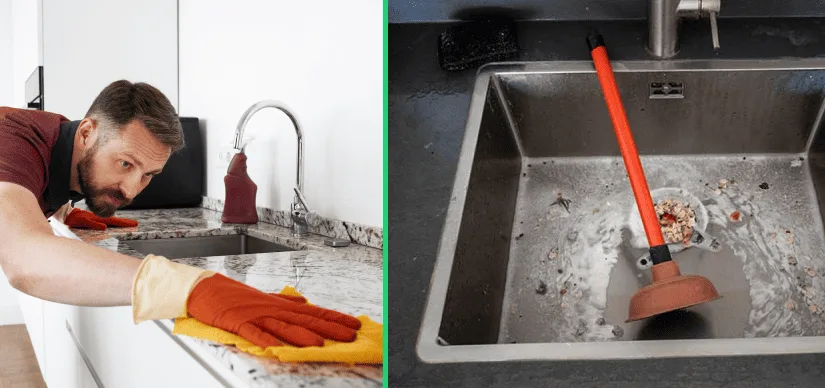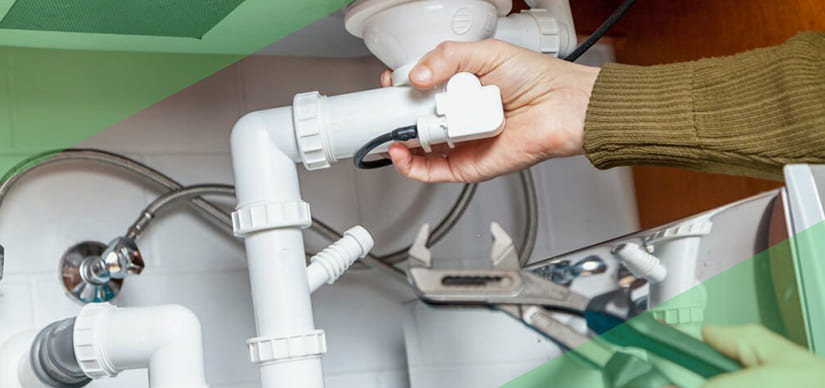How To Find a Plumbing Leak In Your Home
Views : 1115
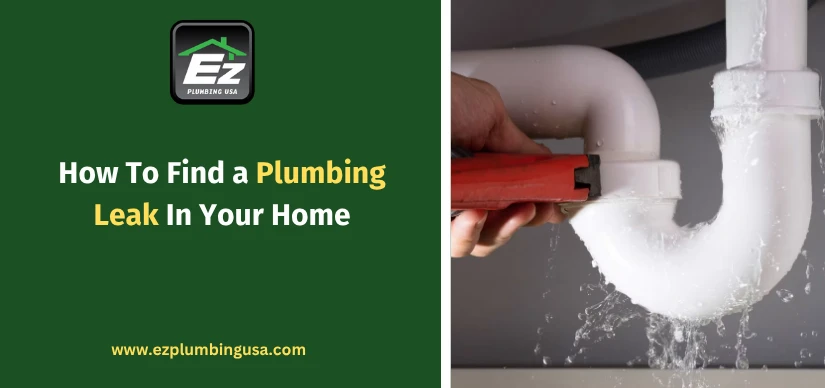
Whether you lease or own your house, there’s a solid chance that you’ve sometimes found yourself lying awake during the night hearing the drip, drip, drip of water and pondered a) where it was from and b) precisely how bad it could be and how in the course of time you can work it away.
You might have walked into a flooded kitchen because your dishwasher or washer has leaked or found yourself facing a puddle of water and a hole in the roof due to a burst pipe.
None of the situations are that unexpected, or that uncommon, regrettably. Based on what the experts say, at least one in four buildings have this issue, and insurance claims are right down to leaky or burst pipes (or what insurance firms call an ‘escape of water’).
Water damage and mold in the house are incredibly expensive, including from an insurance perspective, and maybe it is high time for you to pay a plumber to repair the issue. If you cannot avoid all leaks, you may take steps to lessen the chance of significant damage to your house.
Some leaks are not as obvious as a continuous drip, drip, drip that can keep you up during the night. A number of water leaks are broadly speaking a lot more subtle before a drip becomes an overflow, which explains why quickly finding them is important.
How To Identify A Water Leak In Your Home
How To Identify An Underground Water Leak
It is possible to identify a water leak in your home, even though you can’t see any water anywhere.
Check your water usage often, and this means you can easily see any sudden raises that you can’t associate with a cause (such as having guests or watering your garden more in warm weather), which could be a signal of a leak. Sign-up for an account or ask your water provider to send you regular monthly statements, which means you will keep an eye on the water you are using.
Realizing a leak in water pressure when you are filling up the shower or going for a shower may be an indicator of the leak. You can verify this by turning off all of your fixtures then turning one back again. If the pressure is greater than it was, it is most likely a leak.
But in a shower, low pressure may also be due to a clogged showerhead because of a build-up of limescale. If your shower has stopped your bath, you might have a defective shower or shower diverter. You could clean your showerhead using a limescale remover and frequently check the shower or shower diverter to find out if this is helpful.
Monitor when a hot water heating unit/boiler occurs – if it is on nearly continuously, you might have a leak in your water pipe. These will be underground and may be harder to detect than other leaks.
General Places For Water Leaks
Have you found pools of water or wet areas on your floor without visible signals there is a leak in your roof? Smells certainly are a giveaway, too – underground leaks have a tendency to take much longer, which results in mold growth. The odor resulting from a combination of leak factors and mold growth is distinguishable to a certain extent. Call a good slab leak detection Huntington Beach company and verify if there is a leak.
If you do not want to help more when searching for signals of a leak, consider using a leak detection tool. There are many on the market, and everything works slightly in a different way. A plumbing company offering services for slab leak detection in Huntington Beach will have the tools to detect all hidden and potential plumbing leaks.
A slab leak detection Huntington Beach service provider will also help you install water leak detection tools. A leak recognition tool triggers an alert if there is a leak, which is delivered to you on the mobile app, providing you an opportunity to look and find out if it is something, it is possible to fix. Speak to a slab leak repair Huntington Beach company if you suspect a slab pipe leak. A leak recognition tool may potentially save you time and money, and this makes it a worthwhile investment.
General Places For Water Leaks
If you believe you have a leak and don’t have a leak detector that lets you know where it could be, there are a few common triggers around the house it’s well worth checking first:
Water container/boiler: Always check the valves that take water into or out of the boiler or water container. You need to quickly see a leak. If there isn’t any water escaping, search for indicators of a sluggish leak leaving marks onto the floor beneath the valve or probably a hissing sound. If you have a central heating system boiler, this is not something it is possible to fix yourself, and a leak might be an indication of something significantly wrong, so contact an expert in slab leak repair in Huntington Beach.
Toilets: It isn’t uncommon for a bathroom to start leaking. Bathroom systems or pipe leaks are fairly common in many houses, and residents are usually not very concerned about them, but it could be expensive if it’s continuously running. You may be capable of correcting it yourself; changing a washer is comparatively straightforward and saves your money. But if you suspect an underground leak is causing the bathroom leaks, call for a slab leak repair Huntington Beach company.
If you aren’t sure your bathroom is leaking, the best tip is to place food color in the container and leave it for 10 minutes. If you return back and the water in the bowl is not the same color as the water in the container, a leak is likely.
Showerheads: Similar to toilets, we make use of showers on a normal, or even daily, basis. This implies the parts start to wear out, and it’s likely you’ll find leaks. We’ve previously spoken about how low pressure may be the indication of a leak (as well as a blocked showerhead), so it is practical this might be the main place to check if you think you are having issues.
Home appliances: Through everyday use, home appliances can change slightly with their original position that may loosen valves and pipes, and lead to leaks. Check them on a regular basis to ensure all of the accessories are secure.
Water leaks can occur inside or beyond your home. We’ve already seen where you can try to find leaks inside, but how about outside – where do you begin?
How Accurately Can You Identify A Water Leak Outside Or In Your Garden?
If you can’t find any noticeable indications of a water leak in the home, you can see if it’s inside but concealed (underground, for example) or outdoors by checking your water meter.
You could shut off all water sources and check the meter to find out if the meter is still moving. If it’s, then the leak is on the source line outdoors your house. If it isn’t, then your leak will undoubtedly be inside, either on an in-house pipe or on your devices.
If you think that the leak is outside, begin looking for signs. In case your meter is set up in your garden, this may include seeing if you can find muddy areas around the pipe or if some areas of your lawn appear to be growing much better than other areas of your yard.
Knowing how lousy the leak is may possibly – regrettably – involve digging your lawn up. That is something you might like to do before contacting a specialist in slab leak repair in Huntington Beach. If the leak is under concrete, you’ll need to consider other signs. If you find that your pipes are ageing or damaged, it is highly recommended to quickly consult slab leak repipe experts in Huntington Beach.
How To Identify A Water Leak Under Concrete
While looking for a water leak under cement is more difficult than looking for a leaky touch in your bathrooms, it isn’t impossible. We’ve mentioned previously about looking for moist patches on the floor (without visible signs of a leak in the roof) and the smell of mold when you’re searching for underground leaks, and both these signs mean there is a water leak under the concrete.
Additionally, you need to consider cracks in the floor itself due to water getting away or uneven surfaces, meaning the concrete has been pushed up by the leaks. A competent team of slab leak repipe experts in Huntington Beach has the equipment to detect and provide evidence-based reports about leak sources, pipe conditions, and the extent of the damage.
How To Proceed If You Have A Leak
If you do find a leak, the very first thing you must do is see if it’s serious. Could it be likely to worsen promptly and cause significant damage? Alternately, could it be restricted to a specific item, a bathroom or washer, for instance? If it’s a considerable drip, we always recommend getting in touch with experts in slab leak detection in Huntington Beach or a team of slab leak repipe experts in Huntington Beach.
You can turn off the water if you have the materials you will need to make the repair. If it’s a far more critical leak, you’ll need to carefully turn off the water at the stop tap. If no water is going into your home, the leak shouldn’t get any worse.
Important: It’s also advisable to switch off the electrics to any area of the house that has a leak.
Always call a specialist in slab leak repair in Huntington Beach or slab leak repipe experts in Huntington Beach to assist you in finding, diagnosing, and fixing leaks. A water leak in your house is practically no time for DIY work! Our plumbers at EZ plumbing can assist you in finding hidden leaks and manage them fast before they cause more damage to your house.
For 24/7 expert plumbing service within Huntington Beach, give us a call today!

